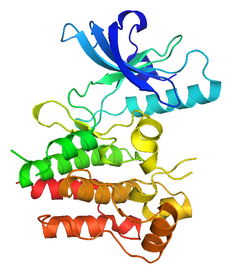Biology:MuSK protein
| muscle, skeletal, receptor tyrosine kinase | |
|---|---|
 | |
| Identifiers | |
| Symbol | MUSK |
| NCBI gene | 4593 |
| HGNC | 7525 |
| OMIM | 601296 |
| RefSeq | NM_005592 |
| UniProt | O15146 |
| Other data | |
| Locus | Chr. 9 q31.3-q32 |
MuSK (for Muscle-Specific Kinase)[1] is a receptor tyrosine kinase required for the formation and maintenance of the neuromuscular junction.[2] It is activated by a nerve-derived proteoglycan called agrin,[3] which is similarly also required for neuromuscular junction formation.[4]
MuSK signaling
Upon activation by its ligand agrin,[5] MuSK signals via the proteins called casein kinase 2 (CK2),[6] Dok-7[7] and rapsyn, to induce "clustering" of acetylcholine receptors (AChR). Both CK2 and Dok-7 are required for MuSK-induced formation of the neuromuscular junction, since mice lacking Dok-7 failed to form AChR clusters or neuromuscular synapses, and since downregulation of CK2 also impedes recruitment of AChR to the primary MuSK scaffold. In addition to the proteins mentioned, other proteins are then gathered, to form the endplate to the neuromuscular junction. The nerve terminates onto the endplate, forming the neuromuscular junction - a structure required to transmit nerve impulses to the muscle, and thus initiating muscle contraction.
Role in disease
Antibodies directed against this protein (Anti-MuSK autoantibodies) are found in some people with myasthenia gravis not demonstrating antibodies to the acetylcholine receptor.[8] The disease still causes loss of acetylcholine receptor activity,[9] but the symptoms affected people experience may differ from those of people with other causes of myasthenia gravis.[citation needed]
References
- ↑ "Receptor tyrosine kinase specific for the skeletal muscle lineage: expression in embryonic muscle, at the neuromuscular junction, and after injury". Neuron 15 (3): 573–584. Sep 1995. doi:10.1016/0896-6273(95)90146-9. PMID 7546737.
- ↑ "The receptor tyrosine kinase MuSK is required for neuromuscular junction formation in vivo". Cell 85 (4): 501–512. May 1996. doi:10.1016/s0092-8674(00)81251-9. PMID 8653786.
- ↑ "Agrin acts via a MuSK receptor complex". Cell 85 (4): 513–523. May 1996. doi:10.1016/s0092-8674(00)81252-0. PMID 8653787.
- ↑ "Defective neuromuscular synaptogenesis in agrin-deficient mutant mice". Cell 85 (4): 525–535. May 1996. doi:10.1016/s0092-8674(00)81253-2. PMID 8653788.
- ↑ "Agrin acts via a MuSK receptor complex". Cell 85 (4): 513–523. May 1996. doi:10.1016/s0092-8674(00)81252-0. PMID 8653787.
- ↑ "Casein kinase 2-dependent serine phosphorylation of MuSK regulates acetylcholine receptor aggregation at the neuromuscular junction". Genes & Development 20 (13): 1800–16. Jul 2006. doi:10.1101/gad.375206. PMID 16818610.
- ↑ "The muscle protein Dok-7 is essential for neuromuscular synaptogenesis". Science 312 (5781): 1802–5. Jun 2006. doi:10.1126/science.1127142. PMID 16794080. Bibcode: 2006Sci...312.1802O. http://www.sciencemag.org/cgi/content/abstract/312/5781/1802.
- ↑ "Auto-antibodies to the receptor tyrosine kinase MuSK in patients with myasthenia gravis without acetylcholine receptor antibodies". Nature Medicine 7 (3): 365–8. Mar 2001. doi:10.1038/85520. PMID 11231638.
- ↑ "Plasma from patients with seronegative myasthenia gravis inhibit nAChR responses in the TE671/RD cell line". Pflügers Archiv 428 (5–6): 492–8. Oct 1994. doi:10.1007/BF00374570. PMID 7838671.
 |

